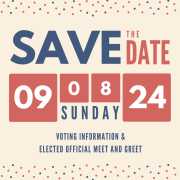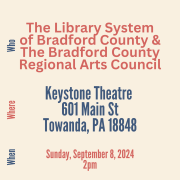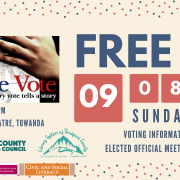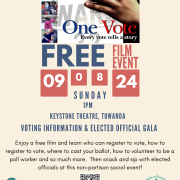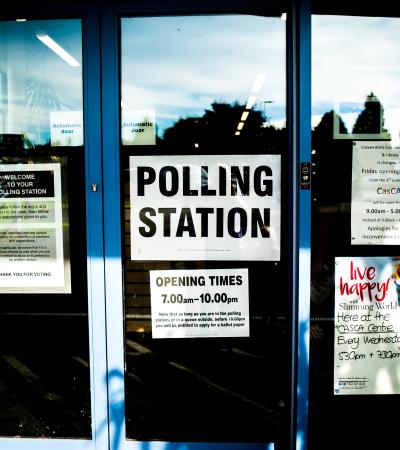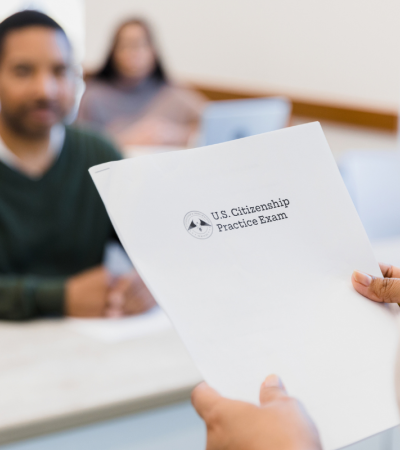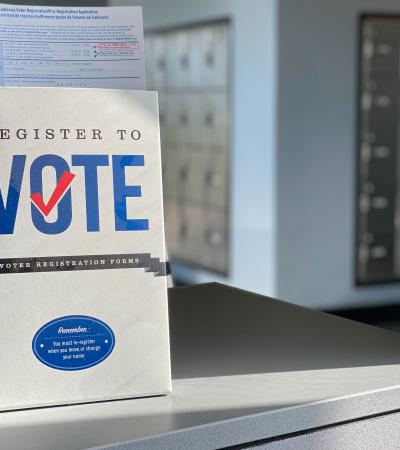The Library System of Bradford Count partnered with the Bradford County Regional Arts Council (BCRAC) to host a community conversation regarding voting rights and a free screening of the film "One Vote" followed by a panel of experts sharing voter registration, poll worker volunteers and voting resources. The event was capped off by a meet and greet with area elected officials to demonstrate the number of people involved in local and regional governance.
Advanced Planning
Goals:
- Inform participants about obstacles some experience to casting their vote.
- Educate viewers about laws and regulations in our area pertaining to voter eligibility, registration and casting a vote.
- Provide timely and pertinent resources for further examination including important deadlines, polling places and volunteer needs.
We began planning in April before the September event. The library system administrator partnered with the BCRAC program manager to select a pertinent, non-partisan, informative film to be used in conjunction with the established community conversation framework.
Steps:
The first step was to decide on the framework of the event. We chose to have a community conversation and selected to show the film "One Vote." BCRAC secured the screening rights.
We then brainstormed regional organizations and stakeholders, including school guidance counselors, the county elections officer, the county Commissioners and the League of Women Voters. We collected and curated relevant resources including deadlines, eligibility rules, registration tools and polling place locations and needs. We requested support items from the League of Women Voters, Vote Riders and other organizations and networked with potential panelists including the elections officer, League of Women Voters, current poll workers, etc. We also met with County Commissioners to discuss the goals of the event and answer questions.
For marketing, we designed Save the Dates and invitations and ordered postage and address labels. We also compiled a list of names and mailing addresses of state and local elected officials including Federal State Senators and Representatives, State Governor, State Senators and Representatives, County Commissioners, County Auditors, County Attorney, County Coroner, County Prothonotary, County Sheriff, Mayors, township supervisors, etc.
Two months in advance, we addressed and stamped all Save the Dates and invitations and sent them to 200 addresses.
For event logistics, we coordinated with panelists and potential volunteers and coordinated with the county elections officer to secure relevant documents and resources. We then set social media marketing into motion. A Facebook event was created and we answered questions from the press and elected officials regarding the event.
One month in advance, we sent invitations with RSVP postage-paid postcards and sent invitations to local press including papers, radio stations, television and others.
Two weeks in advance, we sent a press release to all local press, arranged for catering and ordered decorations. We also began social media posts for both voting informational and event-specific posts.
Before the event, we confirmed volunteers, catering and decorations and finalized informational assets for the event. We also confirmed that the technology and film worked correctly.
On the day of the event, we set up decorations and informational pieces, received catering and set up the film screening. After the event, we sent follow-up thank you notes and post-event press.
Marketing
Due to our rural area, reaching a wide number of people is always difficult. We chose a multi-pronged marketing approach:
- Sent a flyer to school guidance counselors for first-time or soon-to-be voters and shared event with workforce development advisory board of local school with whom library coordinates.
- Displayed flyers in all libraries.
- Created a Facebook event with all member libraries and our partner as co-hosts.
- Sent personal Save the Dates to elected officials two months in advance.
- Sent personal invitations to elected officials and press one month in advance.
- Created a display in the theatre lobby highlighting voting, resources, and the event.
- Sent press releases to all local papers two weeks in advance of the event.
- Shared voting information posts and event posts every other day at various times of day in the two weeks leading up to the event on multiple social media platforms.
- Shared posts in multiple regional social media groups including county events pages and homeschooling groups.
- Hung flyers in public spaces such as bulletin boards at convenience stores and post offices.
- Asked partner organizations to share the event.
Budgeting
Using the funds from receiving ALA's Peggy Barber Tribute Grant, we had access to $2,500. We spent:
- $550 on advertising including invitations, postage, and social media ads.
- $500 on catering and drinks including plates and napkins
- $1000 for use of the theatre
- $110 for decoration
- $340 for staffing time
Tips to cut costs:
Normally we trade marketing (library) for the use of space (theatre) to prevent the need to pay for the space. This could also be hosted in a library with adequate space to show a film.
Catering and drinks do not need to be provided. The decision was made to include it to help attract participation, especially by local elected officials.
Invitations could be hand delivered to local elected official offices. The invitations could also be printed in-house if that capability exists. Digital invitations could also be used.
Decorative pieces could be made in-house or repurposed from other events. The library system purchased bunting for the tables, patriotic-themed stars and balls to hang from the doorways and tables, and a photo backdrop. The library also repurposed voting posters, decorative items and a photo backdrop stand from previous events and other sources.
Day-of-event Activity
The program was held at a local theatre and they provided the tech setup and testing and we set up the decorations the day of the event.
The library system administrator and the programming director of the theatre did the set up of decorations and informational pieces. An additional person would have been helpful. The catering was set up by the provider which was a tremendous help.
Volunteers were primarily used for the information table.
Program Execution
Despite our ambitious efforts, we had a disappointing turnout. Two elected officials (two of our County Commissioners) attended despite 200 invitations being sent. One member of the press was present (seven invitations were sent). Two volunteers came along with three citizens.
We faced a competing political event which may have been a contributing factor to our low turnout. Those who attended the event were very engaged and knowledgeable and there was a great conversation. The feedback was positive. One person did say that they did not see the promotion of the event until the day before the event which is troubling considering the number of posts, flyers, press releases and ads that were used.
We did not reach as many people as we would have liked and the people who participated knew most of the information we were sharing or at least how to obtain it. However, there were many unexpected positive outcomes from the event. The Library System connected with a volunteer from a healthcare workers alliance that is promoting civic engagement who offered to host voter registration drives at the libraries. We also shared resources to the benefit of both groups.
The film also generated several great questions, particularly regarding the difficulty in reaching polling places for those living in remote areas, connecting vulnerable populations such as the unhoused or illiterate to community resources such as ride shares, help to obtain birth certificates or other identifying documents to register to vote, or assistance with completing vote by mail. This conversation spurred interest in identifying organizations and groups including the libraries that may be able to help bridge that gap.
The biggest spark, however, was regarding those in detention centers who are pretrial or not serving time for an offense that removes voting eligibility. Through that conversation, we were able to dig deeper locally to find out what if any resources were being provided to our county jail. We found out that the Elections Officer only provides vote by mail to those who request them and does not provide an educational piece to inform offenders of their rights.
After many conversations at state and national conferences, we determined that this is fairly common and an area where libraries may be able to assist provided that correctional facilities will permit incoming flyers and information-sharing presentations or resources.
Advice
Based on likes, comments and shares of social media posts, it seemed like there was interest in the event. However, that did not translate into attendance. It was a beautiful day after many rainy days and there was a competing political event we were not aware of that definitely contributed to the low turnout.
It is troubling that we did not hear back from many elected officials. We received four RSVPs saying they could not attend, but we sent out 200. In the future, we would check in with those invited to see if there are questions or concerns that could help offset this disparity. Apparently, mailed invitations and RSVPs are outdated, at least in our area.
Make sure you have a clear and catchy title to attract more interest. Ours was utilitarian but not particularly interesting and did not attract an audience. This may have been an issue of the library's idea of what patrons need and what patrons will attend not matching up well.
Be very clear about what participants should expect. We believed we were frank that this was a non-partisan informational event. It is possible that our invited elected officials did not understand that we wished to honor their work and would not permit political speech or attacks. The one commissioner who did not attend, however, seemed frustrated that we said we could not permit political speech.
Supporting Materials
- Feedback (Coming Soon!)
- Programming Librarian Facebook Group

